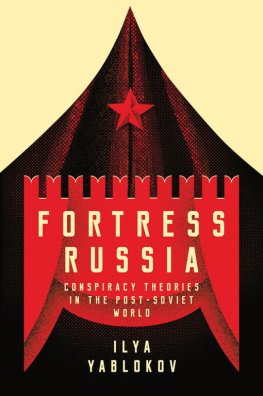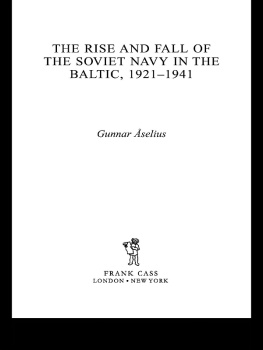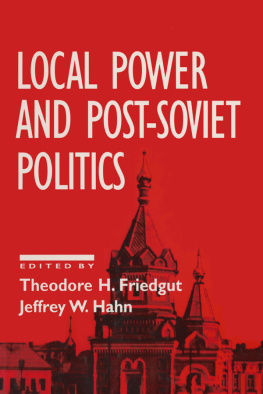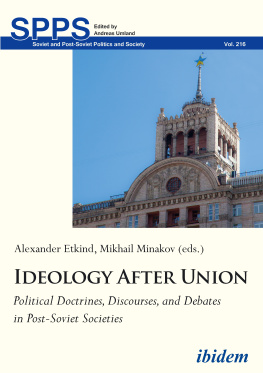Soviet Heroic Poetry in Context
Soviet Heroic Poetry in Context
Folklore or Fakelore
Margaret Ziolkowski
University of Delaware Press
Newark
Published by University of Delaware Press
Co-published with The Rowman & Littlefield Publishing Group, Inc.
4501 Forbes Boulevard, Suite 200, Lanham, Maryland 20706
www.rowman.com
10 Thornbury Road, Plymouth PL6 7PP, United Kingdom
Copyright 2013 by Margaret Ziolkowski.
The Song of Milman Parry: Albert B. Lord, The Singer of Tales, 2nd edition, ed. Stephen Mitchell and Gregory Nagy (Cambridge, MA: Harvard UP, 2000).
All rights reserved . No part of this book may be reproduced in any form or by any electronic or mechanical means, including information storage and retrieval systems, without written permission from the publisher, except by a reviewer who may quote passages in a review.
British Library Cataloguing in Publication Information Available
Library of Congress Cataloging-in-Publication Data
Ziolkowski, Margaret, 1952 author.
Soviet heroic poetry in context : folklore or fakelore / Margaret Ziolkowski.
pages ; cm
Includes bibliographical references.
ISBN 978-1-61149-456-3 (cloth : alk. paper) ISBN 978-1-61149-457-0 (electronic) 1. Epic poetry, SovietHistory and criticism. 2. Folklore in literature. 3. Heroes in literature. I. Title.
PG3060.Z56 2013
891.71'009dc23
2013015544
 The paper used in this publication meets the minimum requirements of American National Standard for Information SciencesPermanence of Paper for Printed Library Materials, ANSI/NISO Z39.48-1992.
The paper used in this publication meets the minimum requirements of American National Standard for Information SciencesPermanence of Paper for Printed Library Materials, ANSI/NISO Z39.48-1992.
Printed in the United States of America
For Bob and Ann Wicks,
for all that we have shared.
Contents
Preface
In 1979, the Albanian writer Ismail Kadare met Albert Lord, author of The Singer of Tales (1960), whose path-breaking and extraordinarily influential study of the principles of oral composition has had an impact on the study of folklore worldwide. Kadares novel The File on H (1981) is loosely based on the experiences of Lord and his adviser Milman Parry in recording epic materials from illiterate performers in Yugoslavia in the 1930s. In Kadares novel, the activities of the fictitious folklorists, Max Ross and Bill Norton, come to an abrupt end when a Serbian Orthodox monk, jealous of the potential glory that their efforts may bring Muslim Albanian culture, incites mob violence against the two Americans and their recording apparatus. At the end of the novel, as Max and Bill are leaving Albania empty-handed, they discover in a newspaper a realization of a cherished theoretical proposition, the transformation of a real-life event into an epic, in the poetic rendition of their own adventures. After Max reads the poem to Bill, who is going blind, his friend stuns Max by suddenly adopting the traditional pose of an Albanian rhapsode and launching into an accurate repetition of what he has just heard.
Kadares novel captures brilliantly and succinctly some of the key issues surrounding the composition and recording of folkloreits frequent intensely political aspect and its preoccupation with chimerical cultural authenticity. These issues are dramatically displayed in Soviet epic compositions of the 1930s and 1940s, the so-called noviny (new songs), which took much of their formal inspiration from traditional Russian epic songs, byliny (songs of the past), as well as folk laments and more personalized verse accounts, and their narrative content from contemporary political and other events in Stalinist Russia. The noviny were introduced to the Western scholarly community by the Slavicist Frank Miller in his study, Folklore for Stalin: Russian Folklore and Pseudofolklore of the Stalin Era (1990).
In reading and teaching about Russian folklore, which necessitated not only acquainting myself with the history of folklore collection in Russia, but venturing into the history of European folklore in general, I became increasingly convinced that the story of the noviny was at once complex and comprehensible. While it may be tempting to interpret the cultural excrescences of Stalinism as unique aberrations, the reality is often more complicated. Everything, even what may appear to be quintessential products of Stalinism, has a larger chronological and geographical context. The noviny were not simply the result of political fiat, an episode in an ideological vacuum. Their emergence occurred in part because of specific trends and controversies that marked European folklore collection and publication from at least the late eighteenth century on and because of developments in Russian folkloristics from the mid-nineteenth century on that assumed perhaps exaggerated proportions. The demise of the noviny was equally mediated by a host of political and theoretical considerations. This book tells the story of the rise and fall of the noviny in all its cultural richness and pathos, an instructive tale of the interaction of aesthetics and ideology.
Chapter 1 provides crucial background for the study of the rise and fall of the noviny through a discussion of some important eighteenth- and nineteenth-century European instances of the politicized collection of folklore, instances that in many ways are relevant to what took place in nineteenth-century Russia and the twentieth-century Soviet Union. Chapters 2 and 3 are devoted to the theoretical and practical activities of prerevolutionary Russian folklorists who sought to define the contours of oral composition and win the cooperation of largely illiterate peasant performers. Their efforts were instrumental in setting the stage for the creation of controversial contemporary epic material in the Soviet Union of the 1930s and 1940s. Chapter 4 examines the Stalin-era theoretical justification and encouragement of novina production. Chapter 5 considers the poetic and thematic characteristics of the noviny. Chapter 6 delineates the frequently convoluted post-Stalinist academic assault on the noviny. Chapter 7 reintroduces an international perspective and sets Russian folkloric concerns in the context of late twentieth-century discussions of oral compositional issues.
Teaching a Russian folklore course to hundreds of students over several years provided both a challenge and an opportunity. Their questions about the interrelationship of politics and folklore and the nature of authenticity helped refine my thinking about various issues central to this study. I am also once again indebted to the members of the superlative interlibrary loan staff at Miami University, who are always willing to attempt to locate obscure items (sometimes, I think, the more obscure, the better). As for critical feedback, my most careful and thoughtful readers have been my father, Theodore Ziol-kowski, and my husband, Robert Thurston, both of whom have read each and every word of this study at least once. On that basis some might consider me irretrievably implicated in a patriarchal system, but I believe I have benefited from the attention of two true feminists. I have also had the good fortune to enjoy unfailing intellectual support from my mother, children, and friends. The book is dedicated to two of them.
Chapter One
Tampering with the Folkloric Evidence
Famous and Infamous European Precedents
The process by which one person collects and records information from another is potentially and notoriously subject to a variety of corrupting influences. Hence the increasingly elaborate procedures adopted today by human subjects review boards in an era that idolizes accountability. The heady early days of purposeful European collection of folklore in the eighteenth and nineteenth centuries were troubled by less-exacting standards. This has fostered the growth of questionable stereotypes regarding pioneers in the field. The existence and validity of such stereotypes has barely been called into question, except among a small coterie of scholars, despite a vast amount of critical scholarship produced especially in the past half-century. As is generally the case with stereotypes, images of pioneering collectors tend to fall into polarized categories of good and evil. According to these stereotypes, evil early would-be folklorists played fast and loose with their sources, perhaps even manufactured their supposed raw oral material, and in the worst cases, must be denounced as impostors and forgers pure and simple. On the other hand, the intentions of good folklorists were untainted, their agendas benign, and if their ethnographic methods did not achieve todays standards, that was due to forgivable ignorance, not deliberate design. The reality, informed research increasingly suggests, was much more complex, constituting not a bipolar axis, but a continuum, a range of assumptions and behaviors that may be variously interpreted depending to a great extent upon the concerns and prejudices of both contemporary and later interpreters. In any period, value judgments and aesthetic preconceptions are constantly brought to bear in discussions of collection methods and editorial procedures.








 The paper used in this publication meets the minimum requirements of American National Standard for Information SciencesPermanence of Paper for Printed Library Materials, ANSI/NISO Z39.48-1992.
The paper used in this publication meets the minimum requirements of American National Standard for Information SciencesPermanence of Paper for Printed Library Materials, ANSI/NISO Z39.48-1992.